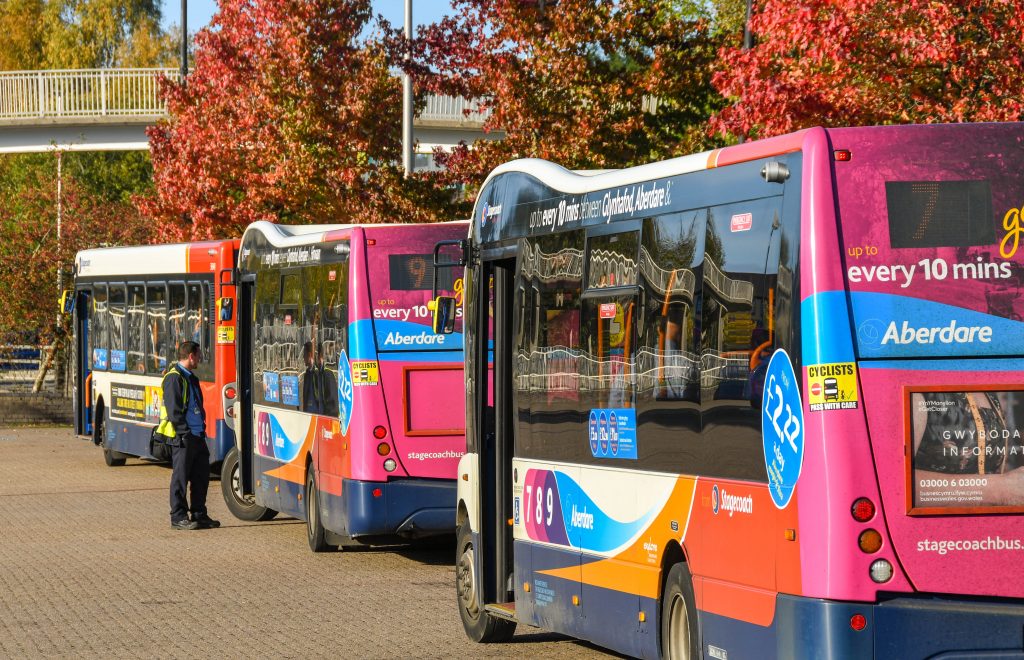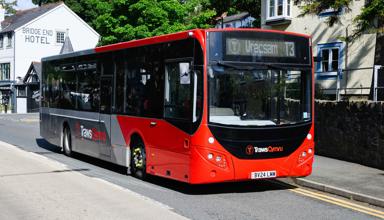The Welsh Government has published a number of legislative proposals relating to bus services and taxi and private hire vehicles (PHVs) in its improving public transport White Paper, published in December 2018. The White Paper also makes proposals relating to concessionary fares and Joint Transport Authorities (JTAs), with the public consultation closing on 27 March 2019.
This is the first of two blog posts on the content of the White Paper. This post considers the proposals relating to buses and concessionary fares. Our second will look at the proposals for taxis and PHVs and JTAs.
Launching the White Paper, the Minister for Economy and Transport, Ken Skates said the:
proposals are aimed at providing better planning and solutions for delivery, putting passengers, local communities and people who currently do not consider public transport as the option to meet their transport needs, at the heart of the decision making.
Driven by devolution
The Wales Act 2017 devolved a number of key transport powers, with the Welsh Government setting out how it intends to use some of these in the White Paper.
In preparation for the Act coming into force, during 2017 the Welsh Government consulted on proposals to improve local bus services, on its concessionary fares scheme and on taxi and private hire vehicle licensing. These consultations have been used to inform the White Paper.
The reforms set out in the White Paper could result in big changes to how bus services and taxis and PHVs operate in Wales.
Direction of travel for buses
The Transport Act 1985 deregulated local bus services in the UK outside of London. This means an appropriately licensed operator can register any service it chooses on a commercial basis. Whilst local authorities can invite tenders for additional routes or services where they consider that social needs are not met commercially, a tendered service cannot compete with a commercial one.
The Welsh Government’s analysis of the latest Department for Transport (DfT) Public Service Vehicle Survey shows that in 2017-18 there were 99.9 million passenger journeys on local buses in Wales. These services covered 99.1 million vehicle kilometres, 20% lower than the distance travelled in 2007-08. Of the distance travelled in 2017-18, 77% was accounted for by journeys on commercial routes, with the remaining 23% of the distance made up of tendered services.
In the White Paper, the Welsh Government suggests that the bus industry is in “decline, with passenger numbers falling steadily for many years on most routes”. A number of factors have contributed this, as explored by the Urban Transport Group’s recent analysis of ‘What's driving bus patronage change’.
One factor affecting bus patronage is increased congestion and our previous blog post explores this trend. The issue which was also considered by the Assembly’s Economy, Infrastructure and Skills Committee in its previous inquiry on the impacts of congestion on the bus industry.
A new route
The Welsh Government believes the proposals set out in its White Paper will improve bus services and increase passenger numbers, stating that:
The legislative framework currently governing bus services in Wales does not provide the flexibility [needed]…[it believes the proposals] can give local authorities the tools and flexibility to tailor their approach and target limited resources more effectively to meet local needs and circumstances.
Its proposals for bus services include introducing Enhanced Quality Partnerships, bus franchising and local authority owned services.
Enhanced Quality Partnerships
Local authorities are currently able to establish voluntary and statutory quality partnership schemes (QPSs) with bus operators. A QPS is an agreement between a local authority and one or more bus operators where the authority provides particular facilities along bus routes such as bus lanes, and in return, operators who wish to use those facilities agree to provide services of a particular standard. Statutory partnerships are backed by a legally enforceable agreement.
The White Paper sets out that the Welsh Government intends to retain these current options but to also allow Enhanced Quality Partnerships (EQPs) to be established.
EQPs would require local authorities and bus operators to work together to develop a plan for the delivery of improved bus services and would enable local authorities to place a much broader range of service standards onto operators than is possible under an existing QPS. In developing an EQP there would also be no requirement for local authorities to invest in infrastructure, which the White Paper states “is considered a limiting factor” to the current use of QPS powers.
Bus franchising
Another option set out in the White Paper is the introduction of bus franchising. Under franchising arrangements a local authority is able to specify what bus services are to be provided in an area including routes, vehicle standards, timetables and fares. The services are operated under contract by private operators through a competitive tendering process, and other operators are prevented from registering other routes within the franchised area, providing exclusivity for the winning bidder. Bus services in London are delivered on a franchised basis.
Local authorities are currently able to establish Quality Contract Schemes (QCS) which are essentially bus franchises. However, powers to establish these are considered complex and to date no QCS has been established in the UK. Previously the North East Combined Authority in England attempted to establish a QCS covering services in the Tyne and Wear area, but the process was complex, costly and plans were ultimately turned down.
The White Paper proposes legislative changes to enable local authorities to set up franchising arrangements using what the Welsh Government suggests is “a more simple process than QCS”.
The proposals would also allow permits to be issued allowing certain commercial services to operate in an area where a franchise is in place. Permits could be issued for services such as TrawsCymru routes which may need to enter into a franchised area but are not classed as “local services”.
Following its ‘New Powers: New Possibilities’ inquiry, the Assembly’s Economy, Infrastructure and Skills Committee wrote to the then Cabinet Secretary for Economy and Transport (PDF,744KB) stating that those who had provided evidence to the inquiry had “urged caution on bus franchising”. The Committee had found:
there was concern [franchising] would be expensive and, particularly in rural areas, could lead to a marketplace with fewer operators.
On the other hand, the Urban Transport Group suggests that “bus franchising gives passengers far more than bus priority [measures do] in isolation” and has produced a briefing (PDF,402KB) which addresses some of the most common arguments used against bus franchising.
Local authority bus services
The Transport Act 1985 currently prohibits local authorities from operating bus companies, except under certain limited circumstances. The White Paper sets out proposals to revise this legislation. It is the Welsh Government’s view that local authorities should be given the power to run local services either directly or via an arm’s length company, owned by the local authority and established for this purpose.
The Welsh Government argues that this would overcome issues that arise when commercial services do not meet local needs. As explained, local authorities can invite tenders for additional services not provided by the commercial network, with such services being publicly subsidised. In some cases very few tenders are received and a lack of competition can increase costs. The Welsh Government therefore suggests this:
potentially results in local authorities paying considerably more for these services than they would otherwise have done.
The White Paper argues that allowing local authorities to run bus services directly would overcome this issue.
During its ‘New Powers: New Possibilities’ inquiry the Assembly’s Economy, Infrastructure and Skills Committee heard evidence suggesting that “a lot of investment” would be required to establish such services and that it would be unlikely for local authorities to do so unless there was a serious failure in the market to provide services.
Information Sharing
The White Paper also proposes to introduce powers allowing the Welsh Ministers to require bus operators and others to release information on bus services. The proposals would enable local authorities to require operators to provide information where services are varied or cancelled, with the aim of ensuring passengers are always able to access accurate information.
(Free) tickets please
The Welsh Government is also proposing to increase the eligibility age for a free bus pass under its Concessionary Fares Scheme.
Currently, those aged 60 and over can apply for a concessionary bus pass which allows for free travel on local bus services in Wales. The White Paper proposes that this eligibility age is increased to bring it in line with a woman’s pensionable age, as is already the case in England. Elsewhere in Scotland, the Government previously considered raising the eligibility age but announced in August 2018 it would remain at 60. The current eligibility age is also 60 in Northern Ireland.
Age UK outlines that by October 2020 the UK Government intends to raise the state pension age, a non-devolved issue, for both men and women to 66. However the White Paper states that the change in eligibility age for a bus pass would be introduced using incremental increases as opposed to a one off change. It also emphasises that:
any person who holds a concessionary pass at the time the changes to the law are made will not lose their entitlement to that pass.
The next stop
The White Paper consultation is due to close on 27 March and the Minister for Economy and Transport has stated that a Bill will be introduced in February 2020 (PDF,840KB).
Ahead of this, the Assembly’s Economy, Infrastructure and Skills Committee will be undertaking an inquiry into the proposals.
In the meantime, read our second blog post which journeys through the Welsh Government’s plans for taxi and private hire vehicles.
Article by Francesca Howorth, Senedd Research, National Assembly for Wales







